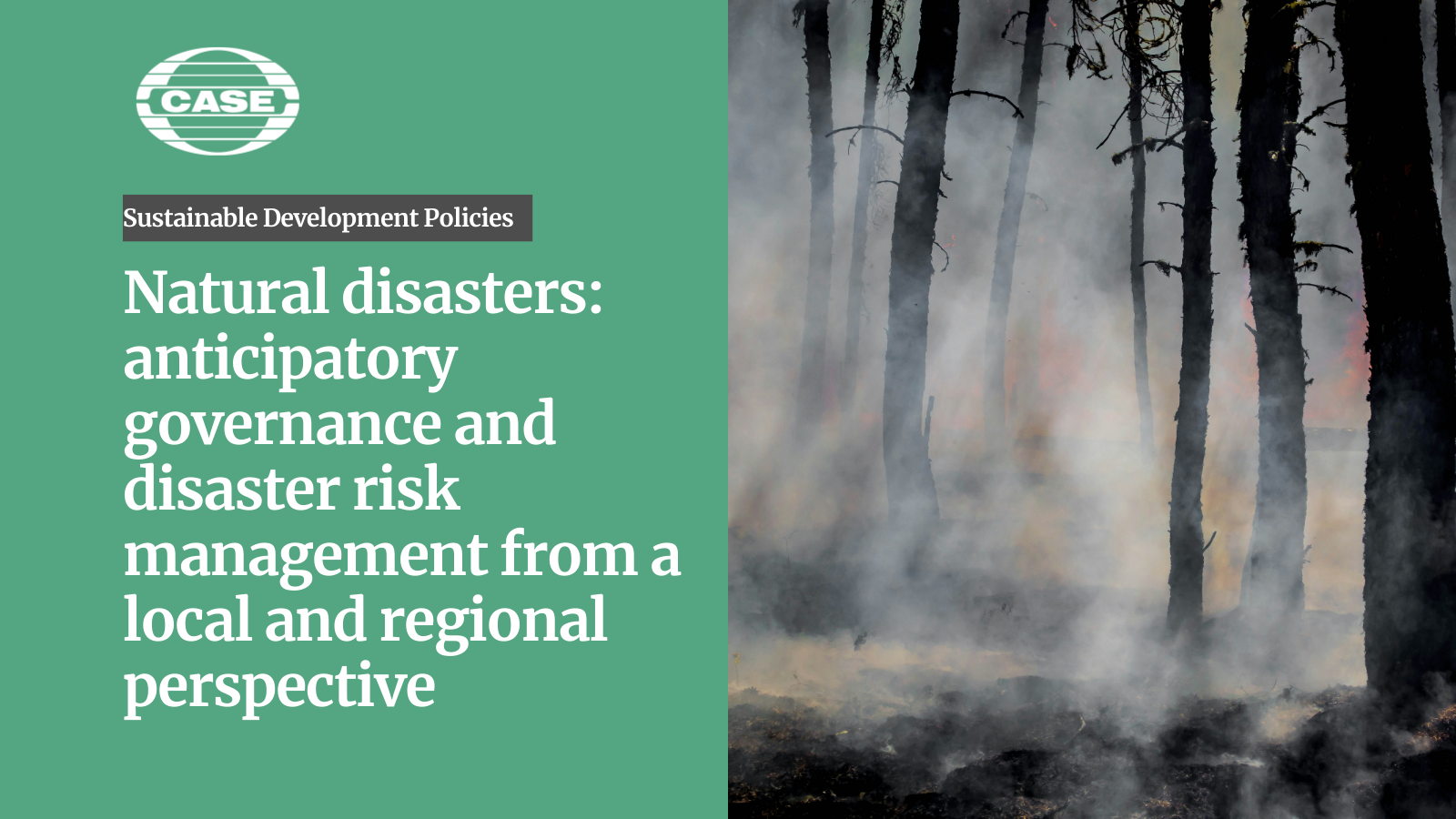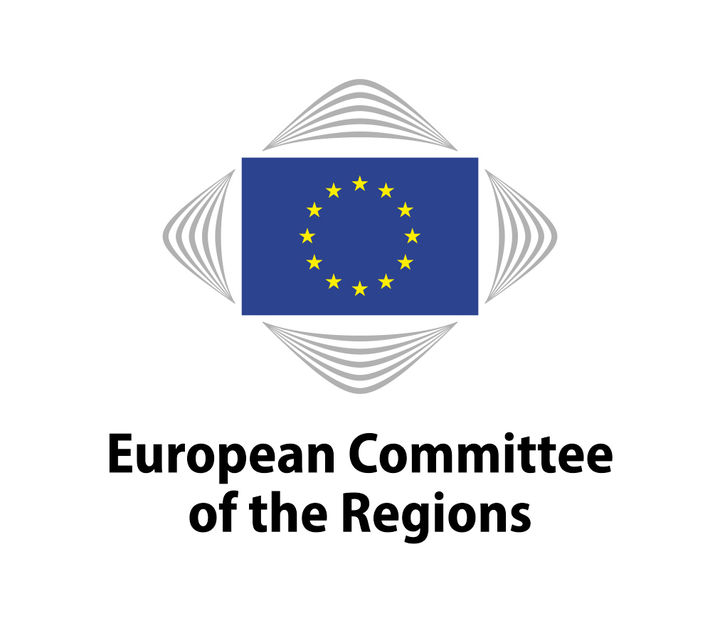 Homepage CASE
Homepage CASE
Selected values

Natural disasters: anticipatory governance and disaster risk management from a local and regional perspective
-
Date:
5 Dec 2023 - 30 Apr 2024
-
Client:

-
Project duration:
05.12.2023 - 30.04.2024
-

Agnieszka Maj
Economist
Agnieszka Maj is an Economist at CASE. She holds an MA degree in International Economic Relations from Cracow University of Economics. Currently, she is obtaining an MA in Gender Studies – Intersectionality and Change at Linköping University. During her education (on both BA and MA levels) she participated in numerous exchange programs at the University … <a href="https://case.dev10.pro/project/natural-disasters-anticipatory-governance-and-disaster-risk-management-from-a-local-and-regional-perspective-2/">Continued</a>
Projects from this author:
-
Local and regional success stories of investing in disaster resilience
The aim of the study is to collect, map and share good practices, examples and success stories of investing in disaster resilience (including but not limited to in response to past disasters and the lessons learned from them) at local and regional level. The study focuses on collecting evidence on initiatives, good practice examples and measures taken by the NAT commission members to improve disaster resilience. The study will be built on interviews with NAT commission members based on a questionnaire. The study will also draw conclusions on the benefits of investing in disaster resilience and make some recommendations to local and regional authorities for moving forward based on the success stories collected from the members demonstrating that smart investment at local and regional level can make a difference in disaster risk reduction. The focus will be mainly, but not exclusively, on extreme weather events and climate-related disasters, given their growing frequency, intensity and impact. The study will contribute to knowledge sharing and exchange of good practices, by collecting and sharing success stories from and by members who have invested in reducing vulnerabilities and strengthening disaster resilience at local and regional level. As a repository of local and regional good practice examples, initiatives and measures relating to disaster preparedness and resilience, the aim of the study is also to feed into a bigger and longer-term project to map success stories of investing in disaster resilience on the ground.
- Cancer: repository of regional prevention and detection policies
-
Study on affordable sustainable housing in the EU
The study will contribute to the reflection on possible policy solutions to affordable sustainable housing in the EU, by examining a number of initiatives taken at (sub)national level innovating in the field of housing and determining how these could be relevant in a European context. The current challenges surrounding the availability of affordable and … Continued
-
Local and regional success stories of investing in disaster resilience
-

Karolina Zubel
Environment, Energy and Climate Change Director
Karolina Zubel holds an MSc from the London School of Economics and Political Science and BA from the University of Warsaw and Sciences Po Paris. Currently, she is a PhD student at the Warsaw School of Economics, focusing her research endeavours on smart cities developments. Her work has been at the intersection of sustainability, low-carbon … <a href="https://case.dev10.pro/project/natural-disasters-anticipatory-governance-and-disaster-risk-management-from-a-local-and-regional-perspective-2/">Continued</a>
Projects from this author:
-
Local and regional success stories of investing in disaster resilience
The aim of the study is to collect, map and share good practices, examples and success stories of investing in disaster resilience (including but not limited to in response to past disasters and the lessons learned from them) at local and regional level. The study focuses on collecting evidence on initiatives, good practice examples and measures taken by the NAT commission members to improve disaster resilience. The study will be built on interviews with NAT commission members based on a questionnaire. The study will also draw conclusions on the benefits of investing in disaster resilience and make some recommendations to local and regional authorities for moving forward based on the success stories collected from the members demonstrating that smart investment at local and regional level can make a difference in disaster risk reduction. The focus will be mainly, but not exclusively, on extreme weather events and climate-related disasters, given their growing frequency, intensity and impact. The study will contribute to knowledge sharing and exchange of good practices, by collecting and sharing success stories from and by members who have invested in reducing vulnerabilities and strengthening disaster resilience at local and regional level. As a repository of local and regional good practice examples, initiatives and measures relating to disaster preparedness and resilience, the aim of the study is also to feed into a bigger and longer-term project to map success stories of investing in disaster resilience on the ground.
- Cancer: repository of regional prevention and detection policies
-
Contribution of Mediterranean cities and regions to building water resilience
The world is currently facing a water crisis driven by overdemand, mismanagement and the impacts of the triple crisis of climate change, biodiversity loss and pollution. Alarmingly, 40% of the global population resides in regions confronting water scarcity. In the southern Mediterranean, particularly within the MENA region, the situation is even more dire. This area … Continued
-
Local and regional success stories of investing in disaster resilience
-

Marek Peda
Marek Peda is responsible for managing research projects funded by European, national, multilateral, and private donors. Mr. Peda has over 10 years of professional experience as a project manager and in conducting research. He gained international exposure while working on projects for international organizations and academic institutions in Spain and the United States. Mr. Peda … <a href="https://case.dev10.pro/project/natural-disasters-anticipatory-governance-and-disaster-risk-management-from-a-local-and-regional-perspective-2/">Continued</a>
Projects from this author:
-
How the EU should prepare for the enlargement in terms of governance, policies and investments: options and choices made from a territorial perspective
In its 2023 enlargement package, the European Commission recommended that the Council open accession negotiations with Ukraine and Moldova. Moreover, it recommended that the Council grant Georgia the status of candidate country and open accession negotiations with Bosnia and Herzegovina, once the necessary degree of compliance with the membership criteria has been achieved. The … Continued
-
The means for cities and regions to support the energy transition in the Mediterranean
Since February 2022, the war in Ukraine has significantly reshaped the geopolitical landscape and exacerbated the multiple challenges and tensions in the Mediterranean region. The conflict has highlighted the vulnerability of traditional energy supply routes, and the need to reassess future energy development strategies in the Mediterranean region. Like the COVID-19 pandemic, geopolitical uncertainties … Continued
-
In search of mechanisms linking the pseudo-causal narratives and policy outcomes: the case of the Trade-Development-Migration nexus in the EU’s approach towards the countries of its Southern Neighbourhood
The project will examine what causal mechanisms link the pseudo-causal policy narratives and policy outcomes in the European Union’s trade-development-migration nexus (hereafter, T-D-M nexus), and how they do it. To address this question, the project will focus on the narratives about addressing the root causes of migration through trade and development cooperation, produced by … Continued
-
How the EU should prepare for the enlargement in terms of governance, policies and investments: options and choices made from a territorial perspective
The COVID-19 pandemic, the war right on our doorstep, the devastating floods in Slovenia, wildfires in Greece and Cyprus, relentless heatwaves in Italy and Spain, to name just a few: all of them highlight the need to better prepare for, cope with and recover from disasters and crises. It is one of the most important challenges for local and regional governments.
The study will focus on how to develop and improve the anticipatory governance approach to disasters, disaster risk management and adaptation by local and regional authorities. The focus is mainly on extreme weather events and climate-related disasters, given their growing frequency, intensity and impact. It will provide a brief overview of regional vulnerabilities across Europe, summarise the state of play, and analyse the benefits of an anticipatory approach, i.e. preparedness for disasters in risk and crisis management (shifting from a reactive approach to a proactive mindset and action) and climate adaptation, as well as the challenges involved in adopting and implementing such an approach, including examples of best practices by cities and local and regional governments that have developed tools and initiatives to address climate change adaptation and disaster risk reduction and management and to integrate them into local and regional planning, in order to strengthen local resilience. Lessons learnt and best practices will also be derived from those local governments that have recovered from past disasters and strengthened their resilience through the UNDRR principle of building back better.
The outcomes of the study will be formulated as concrete future-oriented suggestions for improving the involvement of regions and cities in the implementation of the EU’s disaster resilience goals and working towards a cross-cutting, “resilience-by-design” approach that will allow vulnerability criteria and resilience considerations to be integrated in public policies, regulations, action plans, investment programmes, etc., specifically at local and regional level. The study will include country-focused fiches (with specific attention paid to the regional and local level), including a simple overview of the legislative and financial framework in the field and an analysis of some relevant, and if possible local and regional, future-oriented best practices.
Client: European Committee of the Regions
Project leader: CASE – Centre for Social and Economic Research
Partner: Fraunhofer ISI
Related projects
Thanks for joining us!
You're now part of a community that values [your newsletter's focus]. Get ready to stay informed, inspired, and engaged with our carefully curated content.
